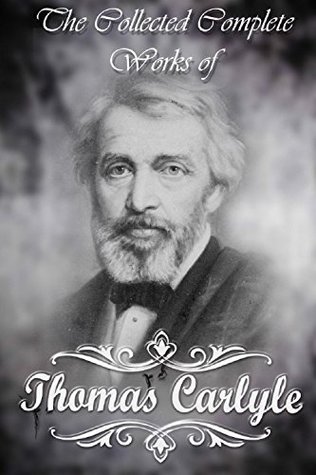Thomas Carlyle was a Scottish philosopher, satirical writer, essayist, historian and teacher. Considered one of the most important social commentators of his time.
Collection of 33 Works of Thomas Carlyle
________________________________________
Early Kings of Norway
History Of Friedrich II. of Prussia, Vol, I
History Of Friedrich II. of Prussia, Vol, II
History Of Friedrich II. of Prussia, Vol. III
History Of Friedrich II. of Prussia, Volume IV
History Of Friedrich II. of Prussia, Volume V
History Of Friedrich II. of Prussia, Volume VI
History Of Friedrich II. of Prussia, Volume VII
History Of Friedrich II. of Prussia, Volume VIII
History Of Friedrich II. of Prussia, Volume IX
History Of Friedrich II. of Prussia, Volume X
History Of Friedrich II. of Prussia, Volume XI
History Of Friedrich II. of Prussia, Volume XII
History Of Friedrich II. of Prussia, Volume XIII
History Of Friedrich II. of Prussia, Volume XIV
History Of Friedrich II. of Prussia, Volume XV
History Of Friedrich II. of Prussia, Volume XVI
History Of Friedrich II. of Prussia, Volume XVII
History Of Friedrich II. of Prussia, Volume XVIII
History Of Friedrich II. of Prussia, Volume XIX
History Of Friedrich II. of Prussia, Volume XX
History Of Friedrich II. of Prussia, Volume XXI
Latter-Day Pamphlets
Life of Friedrich Schiller
On Heroes, Hero-Worship, and the Heroic in History
On the Choice of Books
Past and Present
Sartor Resartus
Sartor Resartus, and On Heroes
The Correspondence of Thomas Carlyle and Ralph Waldo Emerson, 1834-1872, Vol. I
The Correspondence of Thomas Carlyle and Ralph Waldo Emerson, 1834-1872, Vol II
The French Revolution
The Life of John Sterling
Collection of 33 Works of Thomas Carlyle
________________________________________
Early Kings of Norway
History Of Friedrich II. of Prussia, Vol, I
History Of Friedrich II. of Prussia, Vol, II
History Of Friedrich II. of Prussia, Vol. III
History Of Friedrich II. of Prussia, Volume IV
History Of Friedrich II. of Prussia, Volume V
History Of Friedrich II. of Prussia, Volume VI
History Of Friedrich II. of Prussia, Volume VII
History Of Friedrich II. of Prussia, Volume VIII
History Of Friedrich II. of Prussia, Volume IX
History Of Friedrich II. of Prussia, Volume X
History Of Friedrich II. of Prussia, Volume XI
History Of Friedrich II. of Prussia, Volume XII
History Of Friedrich II. of Prussia, Volume XIII
History Of Friedrich II. of Prussia, Volume XIV
History Of Friedrich II. of Prussia, Volume XV
History Of Friedrich II. of Prussia, Volume XVI
History Of Friedrich II. of Prussia, Volume XVII
History Of Friedrich II. of Prussia, Volume XVIII
History Of Friedrich II. of Prussia, Volume XIX
History Of Friedrich II. of Prussia, Volume XX
History Of Friedrich II. of Prussia, Volume XXI
Latter-Day Pamphlets
Life of Friedrich Schiller
On Heroes, Hero-Worship, and the Heroic in History
On the Choice of Books
Past and Present
Sartor Resartus
Sartor Resartus, and On Heroes
The Correspondence of Thomas Carlyle and Ralph Waldo Emerson, 1834-1872, Vol. I
The Correspondence of Thomas Carlyle and Ralph Waldo Emerson, 1834-1872, Vol II
The French Revolution
The Life of John Sterling
BUY NOW
Kindle Edition, 10820 pages
Published February 20th 2017
© 2025 Bibleportal.com 版权所有.

Thomas Carlyle was a Scottish satirical writer, essayist, historian and teacher during the Victorian era. He called economics "the dismal science", wrote articles for the Edinburgh Encyclopedia, and became a controversial social commentator.
Coming from a strict Calvinist family, Carlyle was expected by his parents to become a preacher, but while at the University of Edinburgh, he lost his Christian faith. Calvinist values, however, remained with him throughout his life. This combination of a religious temperament with loss of faith in traditional Christianity made Carlyle's work appealing to many Victorians who were grappling with scientific and political changes that threatened the traditional social order.
... Show more